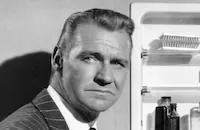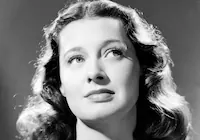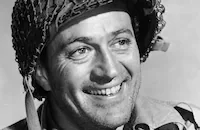The Crooked Way

Brief Synopsis
Cast & Crew
Robert Florey
John Payne
Sonny Tufts
Ellen Drew
Rhys Williams
Percy Helton
Film Details
Technical Specs

Synopsis
Eddie Rice, a veteran suffering from amnesia, returns to Los Angeles from a San Francisco veterans hospital hoping to learn who he is and discovers that he is a gangster named Eddie Riccardi and has a police record. Although he does not know it, five years earlier, Eddie was acquitted of murder after turning state's evidence for homicide detective Lieutenant Joe Williams. His partner, Vince Alexander, took the "rap" and spent two years in prison. On a Los Angeles street, a woman recognizes Eddie and reports him to Vince, who sends his thugs to beat up Eddie. Holding an old newspaper clipping announcing the verdict that put him in jail, Vince confronts Eddie about the past and gives him one day to leave town. After Eddie returns to San Francisco to see his doctor, Kemble, he reads the newspaper clipping and discovers that the woman who recognized him was Nina Martin, a nightclub singer who refused to testify against him at the trial. Returning to Los Angeles, Eddie visits Nina and, after explaining to her that he has amnesia, pleads with her to tell him about his past. Nina reveals that she was his wife, but divorced him three years ago and now works for Vince. Nina bitterly shows Eddie a scar on her shoulder where he once burned her in a rage. Meanwhile, Vince murders Kelly, a gangster whom Williams had hoped to use as an informant. Although Vince later orders Nina to keep Eddie in town, she is beginning to fall in love with the reformed gangster and warns him to leave. Instead, Eddie goes to Vince's gambling house, the Golden Horn, to retrieve Nina, who is a hostess there. Williams, meanwhile, learns that Eddie is suffering from amnesia and goes to the Golden Horn to pick him up. There, Williams accuses Vince of Kelly's murder, and is himself shot dead by Vince. Later, Eddie wakes up and finds himself in Williams' car, holding the murder weapon, and flees. As a dragnet goes out for him, Eddie picks up Nina, then steals a gun from a gunshop before hiding out at the apartment of Hazel, one of the women from Vince's nightclub. One of Vince's henchmen, Coke, who is Hazel's boyfriend, enters her apartment and shoots Nina in the shoulder, then is shot dead by Eddie. Eddie rushes Nina to a doctor, who calls the police, but allows Eddie time to escape. Eddie goes to Vince's warehouse hideout to wait for him and meets Petey, Vince's weak-minded assistant, who has turned informer. Eddie tells a taxi driver who he is in order to lure the police to the warehouse. When Vince returns, he and Eddie engage in a gunfight, and as the police approach, Vince shoots Petey. Out of bullets, Eddie starts a fistfight with Vince and is knocked out. Vince then drags Eddie out to face the police, but Williams' partner, Captain Anderson, knows Eddie is innocent. Petey crawls out of the warehouse and shoots Vince, who returns his fire, killing him. Vince then shoots at the police and is gunned down. Later, Eddie visits Nina in the hospital, and she tells him that he will always be Eddie Rice and kisses him.

Director

Robert Florey
Cast

John Payne

Sonny Tufts

Ellen Drew

Rhys Williams
Percy Helton

John Doucette
Charlie Evans

Greta Granstedt
Raymond Largay
Harry Bronson
Hal Fieberling

Don Haggerty
Jack Overman
Crane Whitley
John Harmon
Garry Owen
Snub Pollard
Crew
John Alton
Benedict Bogeaus
Louis Forbes
Greta
Horace Hough
Max Hutchinson
Joe Kish
Arthur M. Landau
Richard H. Landau
Frank Perkins
Van Nest Polglase
James Stacy
Frank Sullivan
Herman E. Webber
Lee Zavitz

Photo Collections
Videos
Movie Clip


Hosted Intro
Film Details
Technical Specs

Articles
The Crooked Way
Despite the prosaic opening credits of The Crooked Way, this independently produced B-movie released by United Artists proves to be a striking minor triumph highlighted by the taut direction of Robert Florey (The Face Behind the Mask [1941], The Beast with Five Fingers [1946]), John Alton's shadow-laden cinematography, baroque art direction by Van Nest Polglase, evocative, on-location glimpses of a postwar Los Angeles and scenes of intense violence which were considered extreme for its era. The ensemble cast is also impressive with John Payne providing the right mixture of brooding and moral confusion as a man who slowly comes to terms with the brutal animal he used to be.
Like Dick Powell, Payne first rose to leading man status as a romantic lead in musical romances. At 20th Century-Fox, he played opposite Betty Grable, Alice Faye and Sonia Henie in such box office hits as Springtime in the Rockies (1942), Hello Frisco, Hello (1943) and Sun Valley Serenade (1941). And like Powell, Payne changed his image in the postwar years and adapted a tougher, more hardboiled persona that was more appropriate for crime thrillers and westerns. As good as he is in The Crooked Way, however, his co-stars often steal the picture from him from Ellen Drew's slinky, deceptive heroine to Rhys Williams' crafty detective to Percy Helton's pitiable black marketeer who has a fondness for cats. The real surprise here though is the usually wooden Sonny Tufts as Payne's vicious and calculating nemesis; his performance suggests that the rest of his career might have been a mistake of miscasting and bad film choices.
The Crooked Way was derived from a radio program called "High Adventure" which was broadcast on the Mutual network during 1947-1948 and based on the episode "No Blade Too Sharp" by Robert Monroe; Richard H. Landau (The Quatermass Xperiment, 1955) adapted it for the screen. During the pre-production stage, both Shelley Winters and Jeanne Cagney were briefly considered for the Ellen Drew role. The movie also ran into censorship problems, according to AFI sources, which stated that "PCA director Joseph I. Breen requested that producer Benedict Bogeaus "considerably reduce the brutality" in the film, specifically the scene in which "Eddie" is beaten. The PCA Office would not administer a certificate of approval until the action of a man "stamping on Eddie after he has fallen down the ladder" was omitted."
At the time of its release, The Crooked Way was mostly ignored or dismissed as a routine B-movie crime melodrama but The New York Times was more mixed, calling it "....an incredible melodrama bursting with violence..." and that it "races along as a melodrama should and it has more than enough plot to keep its hard-working actors going from one dangerous situation to another. But there is so much pointless brutality in it that one may seriously question whether the movie people are wise to go on with the making of such pictures. The human family may not be perfect, but why subject it to so-called entertainment that is only fit for savage beasts." Thanks to a resurgence of interest in the film noir genre and particularly the work of cinematographer John Alton in the past decade, The Crooked Way is slowly working its way toward a cult status long denied it.
Producer: Benedict Bogeaus
Director: Robert Florey
Screenplay: Richard H. Landau (screenplay); Robert Monroe (radio play "No Blade Too Sharp")
Cinematography: John Alton
Art Direction: Van Nest Polglase
Music: Louis Forbes
Film Editing: Frank Sullivan
Cast: John Payne (Eddie Rice/Eddie Riccardi), Sonny Tufts (Vince Alexander), Ellen Drew (Nina Martin), Rhys Williams (Lieutenant Joe Williams), Percy Helton (Petey), John Doucette (Sgt. Barrett), Charlie Evans (Captain Anderson), Greta Granstedt (Hazel Downs), Raymond Largay (Arthur Stacey, M.D.), Harry Bronson (Danny).
BW-86m.
by Jeff Stafford

The Crooked Way
Ellen Drew, 1914-2003
She was born Esther Loretta "Terry" Ray on November 23, 1914, in Kansas City, Missouri. The daughter of a barber, her family moved to Chicago when she was still an infant and she lived a very quiet childhood far removed from the glamour of Hollywood. She was encouraged by some friends to enter a beauty contest when she was just 17. After winning, she tried her luck in Hollywood, but found that they were no immediate offers for her particular talents.
She eventually took a waitressing job at C.C. Brown's, a famed Hollywood Boulevard soda fountain, and had virtually abandoned her dreams as a starlet when William Demarest, a popular actor's agent and well-known character actor, spotted her. Demarest arranged a screen test for her at Paramount, and she was promptly placed under contract for $50 a week.
For the first few years, (1936-38), Drew got only bit parts, and was often uncredited. When she finally got prominent billing in the Bing Crosby musical Sing You Sinners (1938), she decided to change her name, from Terry Ray to Ellen Drew. She earned her first major role in Frank Lloyd's If I Were King (1938) opposite Ronald Colman, yet for the most part of her career, rarely rose above "B" material and second leads. Still, she had some fine exceptions: Preston Sturges' enchanting comedy Christmas in July (1940), with Dick Powell; Tay Garnett's lighthearted war romp My Favorite Spy (1942) co-starring Kay Kyser; Julien Duvivier's taut The Imposter (1944), holding her own with a brooding Jean Gabin; and Mark Robson's chilling low-budget chiller Isle of the Dead (1945) opposite Boris Karloff. Drew made some notable television appearances in the late '50s including Perry Mason and The Barbara Stanwyck Show, before retiring from the entertainment industry. She is survived by her son David; five grandchildren; and five great-grandchildren.
by Michael T. Toole
Ellen Drew, 1914-2003
Quotes
Trivia
Notes
A pre-production news item in Variety stated that Norman Reilly Raine was writing the film's script; however, his contribution to the final film has not been confirmed. The radio air date of Robert Monroe's play was not found. Monroe was the writer and director of a thriller-drama show called High Adventure, which was broadcast on the Mutual network during the 1947-1948 season, and it is possible that "No Blade Too Sharp" was an episode of this show. As noted in a modern source, Monroe's radio stories were told by members of a "High Adventure Society," who liked stories of "hard action, hard men and smooth women." In mid-November 1948, Hollywood Reporter announced that Shelley Winters was to star opposite John Payne, and in late November 1948, Jeanne Cagney was announced as his co-star.
According to the film's MPAA/PCA file at the AMPAS Library, PCA director Joseph I. Breen requested that producer Benedict Bogeaus "considerably reduce the brutality" in the film, specifically the scene in which "Eddie" is beaten. The PCA Office would not administer a certificate of approval until the action of a man "stamping on Eddie after he has fallen down the ladder" was omitted. As noted in a modern source, much of the film was shot at night in various Los Angeles locations.















